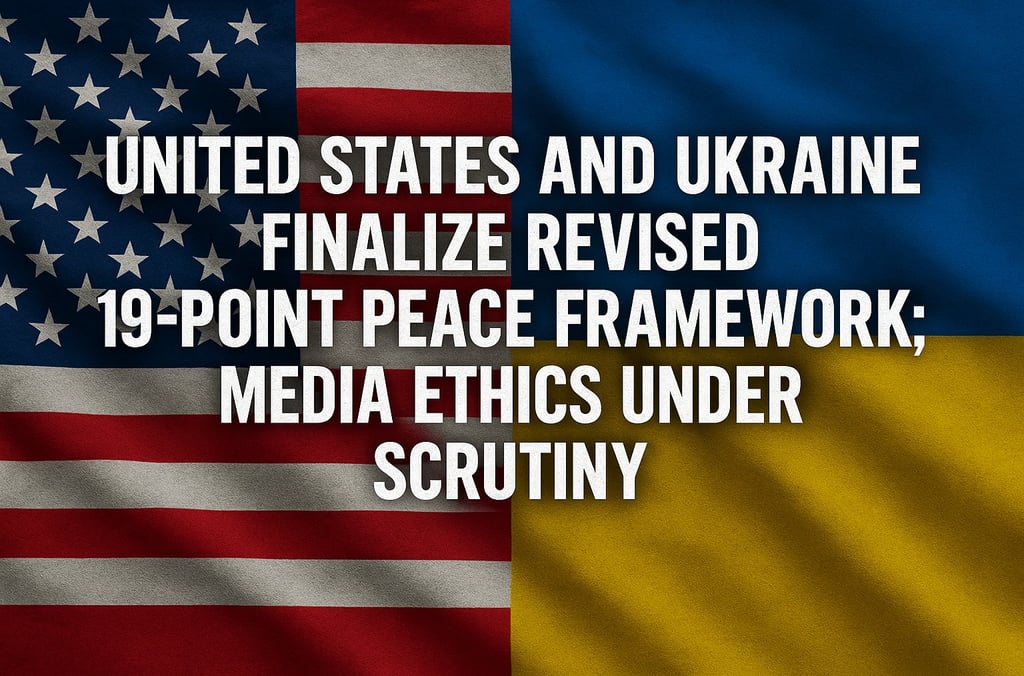United States and Ukraine Finalize Revised 19-Point Peace Framework; Media Ethics Under Scrutiny
The United States and Ukraine have finalized a revised 19-point peace framework, replacing an earlier and widely misinterpreted 28-point preliminary draft that fueled intense criticism and speculation.
UNITED STATES,POLITICS
Global N Press
11/30/20252 min read


By Global N Press — International Affairs Desk
Washington / Geneva / Kyiv — Nov. 30, 2025
The United States and Ukraine have finalized a revised 19-point peace framework, replacing an earlier and widely misinterpreted 28-point preliminary draft that fueled intense criticism and speculation.
The updated framework—confirmed by both American and Ukrainian officials—will form the basis for upcoming direct negotiations between U.S. President Donald Trump and Ukrainian President Volodymyr Zelensky.
1. A Revised Document After Weeks of Tension
Ukrainian President Volodymyr Zelensky confirmed Monday night that the reworked framework now includes “many correct elements,” and is no longer the earlier 28-point version that leaked to the press.
“The current framework is no longer 28 points. Many of the correct elements have been included. The most sensitive issues will be discussed directly with President Trump.”
— President Zelensky
Deputy Foreign Minister Serhiy Kyslytsya emphasized the scale of revisions:
“The new document has almost no resemblance to the original version. It is the product of a tense but highly productive meeting.”
A senior Ukrainian official described the atmosphere in Geneva as “sometimes tense, sometimes relaxed, but ultimately constructive,” calling it typical of negotiations of such importance.
2. The 28-Point Leak: How Media Distortion Shaped a False Narrative
The earlier 28-point draft was merely a preliminary working outline, not a jointly finalized peace plan.
Yet its leak led many mainstream outlets and social-media commentators to portray it as the Trump administration’s final proposal, fueling accusations of “favoring Moscow.”
White House Press Secretary Karoline Leavitt rejected these claims:
“The idea that President Trump is leaning toward Russia is simply a myth.”
In retrospect, the controversy revealed how quickly partial, unverified information can shape global narratives, even before official clarification.
3. Washington’s Role: Structured Mediation, Not One-Sided Concession
According to AFP sources close to the negotiations, the United States exerted significant diplomatic pressure on Kyiv to progress toward a workable peace framework.
The process followed a structured path:
The U.S. drafted an initial outline
Ukraine submitted revisions
The framework was consolidated to 19 points
Presidential-level negotiation will determine final terms
This structured process contradicts the simplistic online narrative that Washington was tilting toward Russia.
4. Ukrainian Priorities Embedded in the New Framework
Ukrainian officials highlight the inclusion of several highly sensitive items:
Full release of Ukrainian prisoners of war and civilians
Return of Ukrainian children taken to Russia
Security guarantees for de-occupied regions
A structured timeline for territorial discussions
President Zelensky welcomed these additions but cautioned:
“Achieving real peace with Russia will require more work.”
5. Russia Rejects Europe’s Alternative Proposal
As Washington and Kyiv advance their joint framework, the Kremlin dismissed a separate European proposal as “non-constructive.”
Moscow has not yet issued an evaluation of the revised 19-point framework.
6. Media Ethics Under Strain: A Global Crisis
The dispute around the leaked draft exposed a growing crisis in modern journalism.
In the pursuit of speed and attention, many outlets amplified unverified, incomplete, and misleading interpretations, failing to distinguish between preliminary drafts and negotiated documents.
Such practices deviate from foundational journalistic standards:
fact-checking, contextual clarity, balanced sourcing, and neutrality.
Global N Press issues a principled reminder:
“In matters of war and peace, the duty of the press is to inform, not inflame; to verify, not speculate.”
The spread of distorted narratives threatens public understanding, undermines diplomatic processes, and damages global trust in journalism.
For this reason, Global N Press strongly condemns the circulation of unverified or distorted interpretations of diplomatic documents still under negotiation.
Only by returning to factual rigor, accountability, and ethical standards can global media institutions regain credibility.




